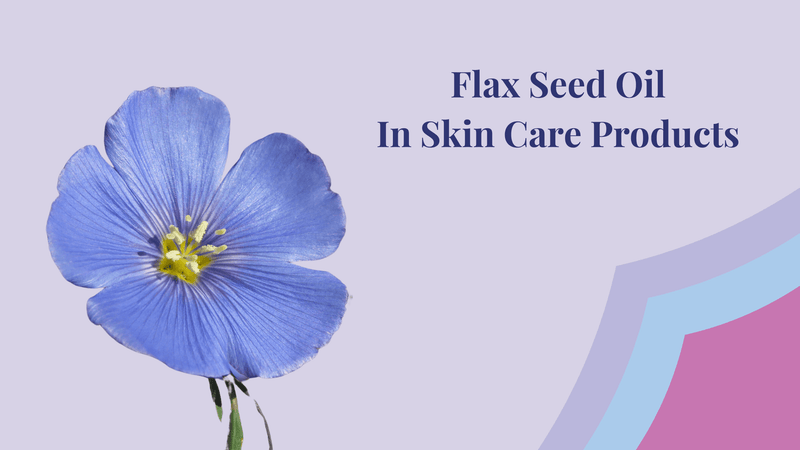
Flax seed oil in skin care products
|
|
Time to read 5 min
|
|
Time to read 5 min
Flax seeds (AKA linseeds) may be small, but they can make a big impact when it comes to skin care. Flax seed oil, extracted by pressing flax seeds, has been used for centuries to benefit health and beauty. But does the science support the hype around this oil? Keep reading to learn all about the benefits and uses of flax seed oil for skin care.
To make sure you only buy the right products for your Baumann Skin Type, you can take the quiz for free by clicking the button below!
[[ctaquiz]]
Flax seeds come from the flax plant, a blue flowering crop that has been cultivated for thousands of years. Flax seeds are about the size of sesame seeds, with a tough outer shell and inner golden seeds. These seeds can be pressed to extract flax seed oil. Flax oil has been prized across history for its healing properties. Ancient Egyptians used flax oil for hair and skin health, while Greek physician Hippocrates recommended it for inflammation. Today, flax remains a popular natural oil for a number of skin concerns with modern scientific evidence to support its use.
Flax seeds feature many active compounds like fatty acids, polyphenols, and more. Some of the most notable components of flax seed and their functions are:
This wide variety of compounds explains the increasingly common use of flax seed oil in skin care products.
With its versatile active compound profile, it's no surprise that flax seed oil offers a variety of benefits for the skin such as: (1,2,3)
When used topically, flax seed oil has a low risk of adverse reactions. However, oral flax oil supplements may cause side effects like diarrhea and stomach upset in some individuals.
The Cosmetic Ingredient Review panel (CIR) published a study on linseed/flaxseed oil that found it and its components safe for use in skin care products. (4)
However, in some especially acne prone skin types, there is a slight chance this oil can clog your pores as it contains comedogenic palmitic acid.
It's also important to note that flax oil can go rancid. Make sure to use flax/linseed products within a few months after opening to prevent them from oxidizing and spoiling.
Avoid putting flax oil directly on injured skin, open wounds, or cystic acne, as it may irritate sensitive areas. Take the Baumann Skin Type quiz, especially if you have very dry or oily skin, to make sure flax oil is right for your skin type before applying all over the face.
[[ctaquiz]]
Thanks to its high concentration and diversity of moisturizing fatty acids, flax seed oil works wonders for ashy or dry skin.
If you have chronically dry skin or eczema, try a flax oil moisturizer. The anti-inflammatory properties of flax can also help soothe red, inflamed patches of skin.
With continued use, flax helps restore suppleness and radiance to dull skin. For those reasons and more, flax seed is a great oil for massage oil products!
Here are some of our favorite moisturizers with flax seed oil:
Flax seed oil does not typically cause acne in skin care products, but is not the best option for everybody because it sometimes clogs the pores of extremely acne prone skin types.
If your skin is not particularly sensitive, this oil can be a good additive to retinoid based products to aid with ingredient penetration since it contains oleic acid. This is our favorite flax seed oil product for acne:
Flaxseed/Linseed oil will not get rid of dark spots if applied on its own. The best treatments for hyperpigmentation include a variety of skin lightening ingredients with various exfoliating, tyrosinase inhibiting, and PAR-2 blocking properties. That being said, there are some great skin lightening products that include flax seed oil such as:
The antioxidant compounds in flaxseed make it a beneficial ingredient in anti-aging skin care products.
Regular use of flax oil may help ward off wrinkles and increase collagen to keep skin looking youthful and supple as you age. The nourishing vitamins and antioxidants in flax can slow down natural skin aging.
While more research is needed, flax oil shows promise as a natural means of slowing collagen breakdown and other changes associated with skin aging. Apply flax oil daily along with sunscreen for the best anti-aging impact.
While more research is still needed, the well-studied chemical makeup of flax make it a safe addition to dry, aging, and inflammation prone skin care regimens. Take the Baumann Skin Type quiz to be sure flax seed oil products are right for your skin type!
[[ctaquiz]]
Botox is a neurotoxin that paralyzes muscles in the face to prevent the development of various facial wrinkles. Botox needs to be injected, and is very potent at what it does. Flax seed oil has functionally nothing in common with botox and is not a suitable replacement to botox. Also, flax seed oil is not an injectable product.
Flax seed oil contains antioxidants which can play a role in eliminating cancer causing free radicals, however, there is no conclusive evidence that flaxseed, or any other ingredient for that matter, is a guaranteed cure or preventor for cancer.
Flax seed has no significant impact on hormones in men or women. Additionally, it is considered non-toxic and safe for use by multiple independent research organizations such as the Cosmetic Ingredient Review panel.



